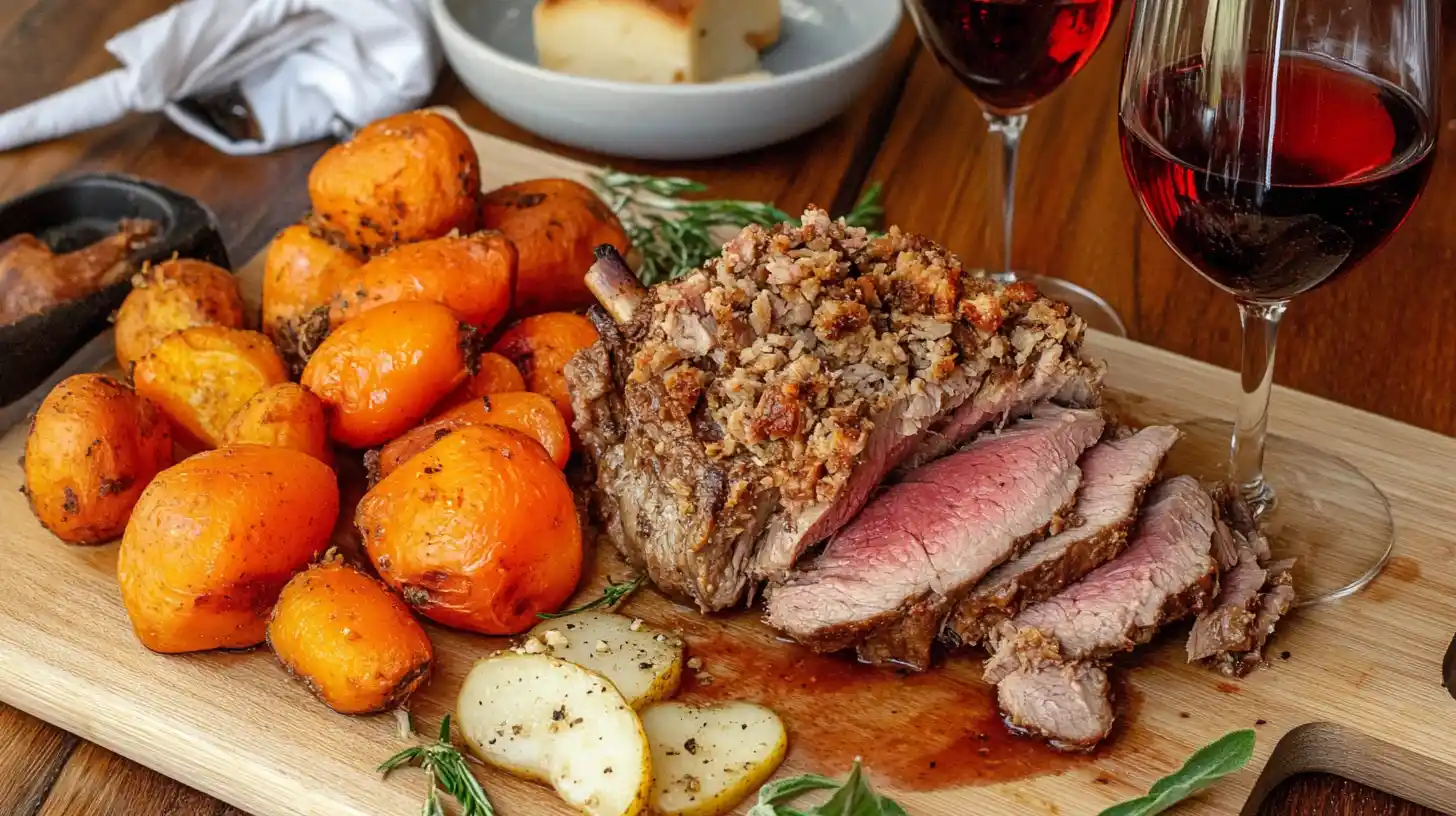When it comes to preparing a deer roast, getting the flavor and tenderness right is critical. As one of the most versatile cuts of wild game meat, deer roast offers rich, earthy flavors and a lean texture that require a bit of finesse to master. One effective way to elevate the taste and texture of venison is to soak a deer roast in marinade before cooking. This step is not just a tradition; it’s a tried-and-true method to reduce the gamey taste while enhancing the tenderness.
Soaking deer roast is more than just marinating—it prepares the meat properly to absorb seasonings, balance flavors, and tenderize its inherently lean structure. Whether you’re new to venison or looking to perfect your approach, understanding the right soaking techniques can make all the difference. In this guide, we’ll walk through soaking methods, ingredients, and step-by-step tips to bring out the best in your deer roast. By the end, you’ll have all the tools you need to create a flavorful meal everyone will enjoy.
Now, let’s explore everything you need to know about how to soak a deer roast in before cooking to get it just right!
Understanding Deer Meat
Deer meat, or venison, is appreciated for its unique blend of flavors and textures. Unlike beef or pork, venison is particularly lean, which makes it a healthier choice for those looking to cut fats from their diet. However, this leanness also means the meat can be tough if not prepared correctly. One way to counteract this is by soaking the meat before cooking, a process that improves both taste and texture.
The distinct, earthy flavor of deer meat—known for its “gamey” taste—can be a hurdle for some. However, soaking the meat helps reduce this intensity, making the roast more palatable, even for those new to wild game cuisine. In addition, traditional soaking options, such as acidic solutions or rich, creamy marinades, offer a variety of flavors to suit different taste profiles. Consequently, soaking is an effective way to enhance the overall eating experience.
So why should you soak your deer roast? The answer lies in its science-backed benefits. Soaking tenderizes the muscle fibers, breaks down connective tissues, and allows marinades to penetrate deeply, ensuring even flavor distribution. Moreover, soaking helps retain moisture, guaranteeing a juicy roast even after hours of cooking. By starting with the right soaking method, you ultimately set the stage for a succulent, flavorful deer roast.
Clearly, soaking isn’t just an optional step—it’s essential for making the most out of venison. In fact, without it, you may miss out on the full flavor potential. With this foundation in mind, let’s now move on to explore the best liquids to soak a deer roast in before cooking.
Best Soaking Liquids for Deer Roast
Choosing the right liquid to soak a deer roast in before cooking is crucial to achieving the desired flavor and texture. Common soaking ingredients each offer unique advantages, from balancing acidity to adding tenderness. Below are the most popular options and their benefits.
Buttermilk
Buttermilk is a favorite among many wild game enthusiasts. Its slightly tangy and creamy flavor complements venison perfectly. Buttermilk’s natural enzymes break down connective tissues, tenderizing the meat wonderfully. Additionally, it reduces the gamey taste while adding mild richness. To soak using buttermilk, simply submerge the roast and refrigerate for 6-12 hours.
Salt Water Brine
Saltwater brine is a go-to option for lean cuts like venison. Specifically, this method works by locking in moisture while also infusing a subtly savory taste. To prepare a salt brine, you start by dissolving salt in warm water—typically 1/4 cup of salt per quart of water—and then let the meat soak for several hours or overnight. Consequently, this technique not only enhances flavor but also ensures that the meat’s natural taste is not overpowered.
Vinegar Solutions
Vinegar-based soaks, such as apple cider vinegar or white vinegar, are another excellent choice. Vinegar not only tenderizes the meat but also imparts an appealing brightness to the flavor profile. A mix of vinegar with water (in a 1:3 ratio) works well for soaking. Including herbs like rosemary or thyme in the solution can add an extra depth of flavor while significantly reducing the gamey aftertaste.
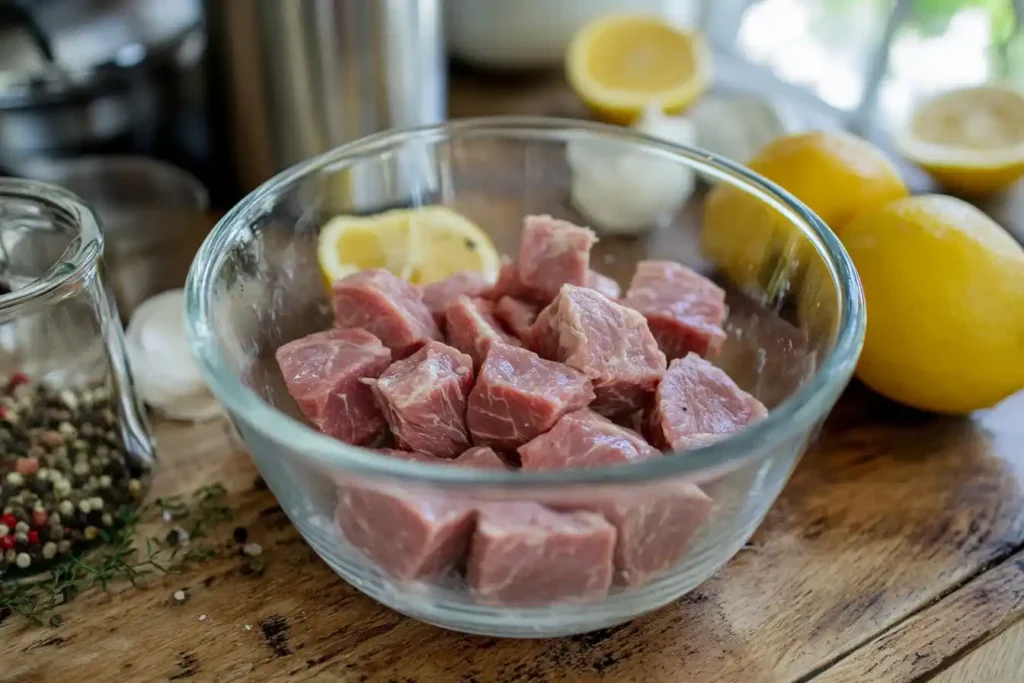
Popular Marinade Ingredients
Once you’ve chosen the primary liquid to soak a deer roast in before cooking, enhancing it with additional ingredients can elevate its flavor even further. Popular marinade components include a mix of oils, acids, and aromatic herbs and spices. Here are three essential elements to include:
Oil-Based Marinades
Oil, such as olive or avocado oil, plays a critical role in marinades. It locks in moisture and acts as a carrier for other flavors. Combining oil with fresh herbs like thyme, bay leaves, or rosemary creates a fragrant base for soaking your venison. Add some minced garlic or finely chopped onions for even more flavor complexity. Together, these ingredients work to tenderize and imbue the roast with depth.
Acidic Components
Acidic ingredients like red wine, balsamic vinegar, or lemon juice help break down tough muscle fibers while enhancing the flavor. While the acidic nature of these elements is powerful, moderation is necessary to avoid overpowering or “cooking” the meat prematurely. A balanced marinade containing one part acid to three parts oil ensures the roast retains its juiciness and focus flavor.
Herbs and Spices
Herbs and spices are the heart of any marinade. For deer roast, woody herbs such as thyme, oregano, and sage pair exceptionally well with the meat’s earthy tones. Combine these herbs with spice staples like ground black pepper and paprika to create a blend that transforms a basic soak into a gourmet experience. Consider adding a touch of sweetness, such as honey or maple syrup, for a balanced finish!
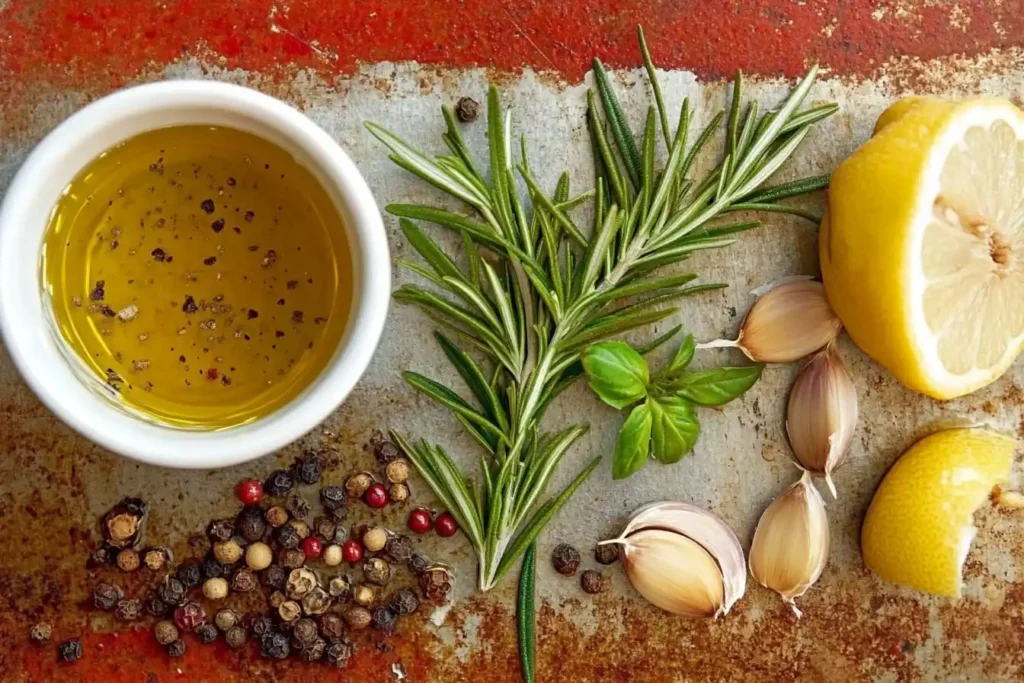
Step-by-Step Soaking Process
Getting the perfect texture and flavor out of your deer roast begins with learning how to soak a deer roast in before cooking using a step-by-step process. This ensures the meat is tenderized evenly and infused with rich flavors. While the process may seem straightforward, each step plays a specific role in creating the perfect venison dish.
Preparing the Marinade
Before soaking, it’s essential to carefully prepare your marinade. A simple yet effective marinade typically includes an acidic component (like vinegar, wine, or lemon juice), spices (such as garlic powder and black pepper), and a balance of salt or soy sauce for seasoning. Start by mixing these ingredients in a large bowl until fully combined. To create depth, you might want to add fresh herbs like rosemary or thyme and sweeteners like honey for a savory-sweet twist.
Marinating Time Recommendations
Timing makes all the difference when soaking a deer roast. For best results, soak your meat for a minimum of 4-6 hours. If you want to maximize tenderness and allow flavors to penetrate deeper, consider an overnight soak of 12-24 hours in your refrigerator. This timeframe allows the acids to break down tough fibers while the herbs, spices, and seasoning enhance the flavor profile. Use this time wisely by preparing the other elements of your meal!
Proper Storage During Soaking
Storing your soaking meat properly helps avoid cross-contamination and ensures food safety. Always seal the meat and marinade in a non-reactive container—glass or resealable plastic bags work best. Keep the sealed container in the refrigerator, ideally in the coldest section. Never leave marinated meat at room temperature, as this can promote bacterial growth. Regularly turn the meat to ensure every side absorbs the marinade evenly.
Pro Tip: Discard used marinade to eliminate food safety risks or boil it if you plan to use it as a sauce.
Variations of Soaking Methods
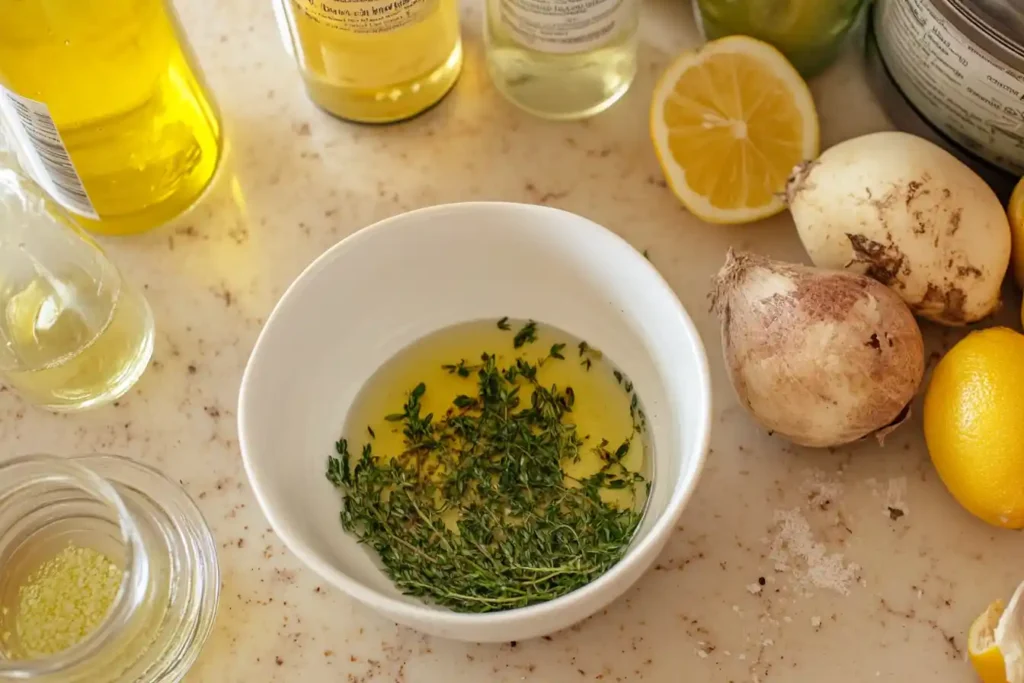
One of the most exciting aspects of preparing a deer roast is experimenting with different methods to soak a deer roast in before cooking to discover unique flavors. From creamy milk-based options to robust wine-infused marinades, each method brings its own twist to your wild game.
Milk-Based Marinades
Milk, or its alternative forms like buttermilk, is a popular choice to soak a deer roast in before cooking. The lactic acid in milk works gently to tenderize the meat, ensuring a smoother bite without overpowering the gamey flavor. To create a milk-based marinade, simply immerse the deer roast in a bowl of whole milk or buttermilk, seasoned lightly with salt and pepper. This method is ideal for those who prefer lighter, natural flavors.
Wine-Based Marinades
For a rich, deep flavor, wine-based marinades are exceptional options. Red wine, with its tannins and acidity, complements the robust nature of venison. Combine red wine with olive oil, minced garlic, onions, and rosemary for a marinade brimming with flavor. Alternatively, consider white wine for a lighter, more delicate infusion, paired with citrus zests and thyme. Let the roast sit for 6-8 hours to allow the wine to work its magic.
Sweet and Savory Blends
If you’re seeking something different, sweet and savory marinades offer a unique twist. Blend maple syrup, soy sauce, and a touch of apple cider vinegar to create an irresistible balance of flavors. The sweetness cuts through the gamey notes, while the vinegar maintains the meat’s tenderness. Adding crushed red pepper provides a hint of spice to round out the flavor combination.
Pro Tip: Choose your marinade based on your preferred cooking style—light marinades are perfect for grilling, while richer blends work well for roasting.
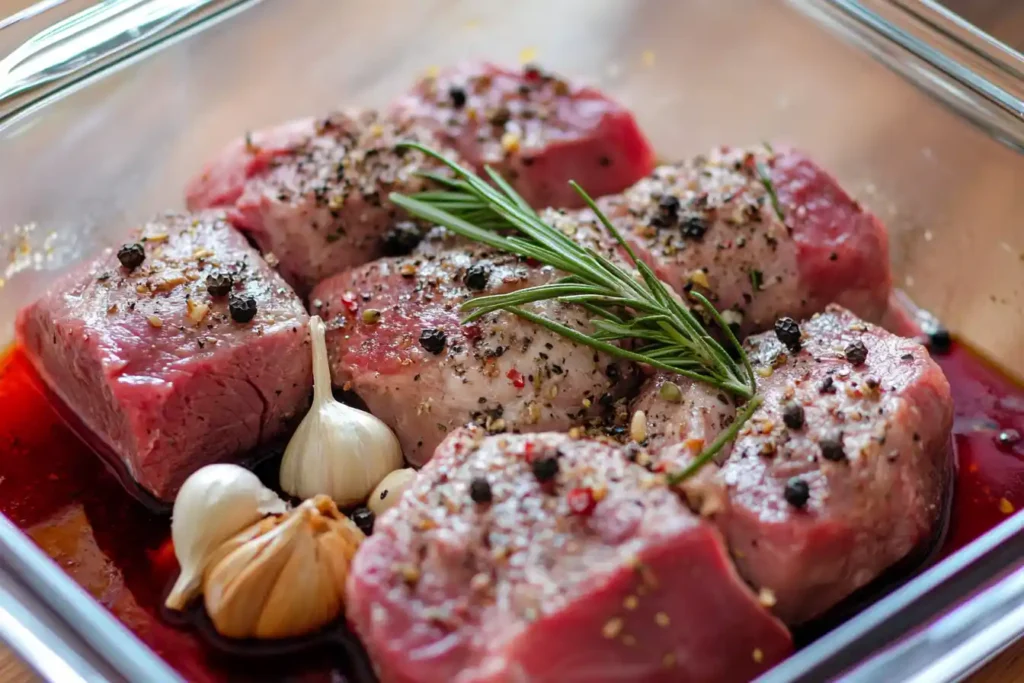
Enhancing Flavor with Additional Ingredients
Incorporating additional ingredients into your marinade enables you to customize and elevate the flavor of your deer roast. Many of these ingredients are versatile and easy to find in your pantry, making them convenient yet impactful additions.
Garlic and Onions
Garlic and onions are the backbone of many marinades. Their deep, savory profiles add complexity to the deer meat, blending harmoniously with other ingredients. Use freshly minced garlic and thinly sliced onions for maximum flavor release, or consider caramelized options for a rich, slightly sweet addition.
Soy Sauce and Worcestershire
For an umami burst, soy sauce and Worcestershire are unbeatable. A splash of soy sauce adds subtle saltiness without overpowering the venison, while Worcestershire provides depth with light tangy notes. Combine them with brown sugar or honey for a balanced sweet-savory glaze.
Citrus Zests and Juices
Citrus fruits such as lemon, lime, and orange can brighten the marinade and reduce gamey undertones. Use the zest for aromatic oils and the juice for acidity. Lime juice pairs particularly well with garlic and chili powder for a zesty, Tex-Mex-inspired marinade.
Pro Tip: Mix and match these ingredients to create a flavor profile that best suits your dinner plans—experimenting is the key!
Experimenting with these variations ensures an extraordinary deer roast recipe that never feels repetitive! For more creative tips, check out our Tips for Making Perfect Crème Brûlée.
Tips for Perfect Soaking
Soaking a deer roast may seem like an easy task, but small tweaks can make a big difference in achieving perfection. Here are actionable tips to ensure your soaking process hits all the right notes.
Balancing Flavors
Getting your marinade’s flavor profile just right is essential. Aim for a balance between salty, sweet, and acidic components. Too much salt can overpower the natural taste of venison, while excessive acidity risks making the meat mushy. Taste your marinade before soaking and adjust seasoning accordingly.
Cutting Meat Properly
The way you prepare the meat affects how well the flavors penetrate. If the roast is too large, consider cutting it into smaller sections to maximize surface area. Cuts should be even to ensure each piece absorbs the marinade uniformly.
Maximizing Tenderness
Beyond selecting the right marinade ingredients, techniques like lightly scoring the surface of the roast can enhance tenderness. This process allows the marinade to seep deeper into the muscle fibers. For especially tough cuts, pre-tenderizing with a meat mallet can also yield excellent results.
Pro Tip: Avoid over-marination as it can affect both texture and taste—stay within the recommended timeframes for optimal results.
Common Mistakes to Avoid
When soaking a deer roast, even experienced cooks can fall into pitfalls that affect the flavor, texture, and safety of the dish. Avoiding common mistakes ensures the most enjoyable and successful outcomes.
Over-Soaking the Meat
One frequent misstep is over-soaking the meat. While soaking enhances flavor, leaving the roast submerged too long can overpower the natural taste of venison. Soaking beyond 24 hours, especially in acidic liquids like vinegar or wine, can break down proteins excessively, making the meat mushy. A soaking window of 8–12 hours is ideal for tenderizing while preserving texture. To avoid this, set a timer or reminder to check on the roast.
Insufficient Marinade Coverage
Another common error is inadequate coverage of the deer roast in the marinade. Partial submersion leads to uneven flavor and tenderness, leaving parts of the roast underwhelmingly prepared. Always ensure the marinade fully covers the meat by using enough liquid or turning the roast periodically to coat all sides. Using a sealable plastic bag is an excellent solution as it allows the marinade to distribute evenly.
Ignoring Food Safety
Food safety mistakes like improper storage during soaking are serious risks. Always marinate the deer roast in a refrigerator set at 40°F (4°C) or below to prevent bacterial growth. Avoid leaving the roast in the marinade at room temperature for any period. Additionally, discard used marinades unless boiled, as raw meat juices may contain harmful bacteria. Prioritize your safety while preparing and soaking the roast.
How to Prevent Mistakes
- Stick to recommended soak times for optimal results.
- Use airtight storage containers or bags for thorough coverage.
- Refrigerate the meat throughout the marination process.
- Never reuse unboiled marinade as a sauce for serving.
Recipe: Classic Venison Roast Marinade
Whether you’re new to cooking venison or a seasoned pro, a tried-and-true marinade recipe can elevate your deer roast. This versatile recipe brings out the best flavors while tenderizing the meat for a mouthwatering result.
Ingredients List
- 1 cup buttermilk or milk
- 1/4 cup olive oil
- 2 tablespoons apple cider vinegar
- 3 garlic cloves, minced
- 1 tablespoon fresh rosemary, chopped
- 1 teaspoon black pepper
- 1 teaspoon salt
- 1/2 teaspoon smoked paprika (optional)
- 1/4 cup soy sauce
Preparation Instructions
- Combine all ingredients in a mixing bowl. Whisk until emulsified for a uniform consistency.
- Place the deer roast in a sealable plastic bag or shallow dish. Pour the marinade over the meat, ensuring full coverage.
- Seal the bag or cover the dish with plastic wrap. Refrigerate for 8–12 hours, turning occasionally to distribute flavors evenly.
Soaking and Cooking Tips
Once the deer roast is marinated, remove it from the liquid and pat it dry. Excess moisture can interfere with proper searing. For maximum tenderness, consider slow-cooking or braising techniques during preparation. Monitor the internal temperature to prevent overcooking, keeping the roast juicy and flavorful.
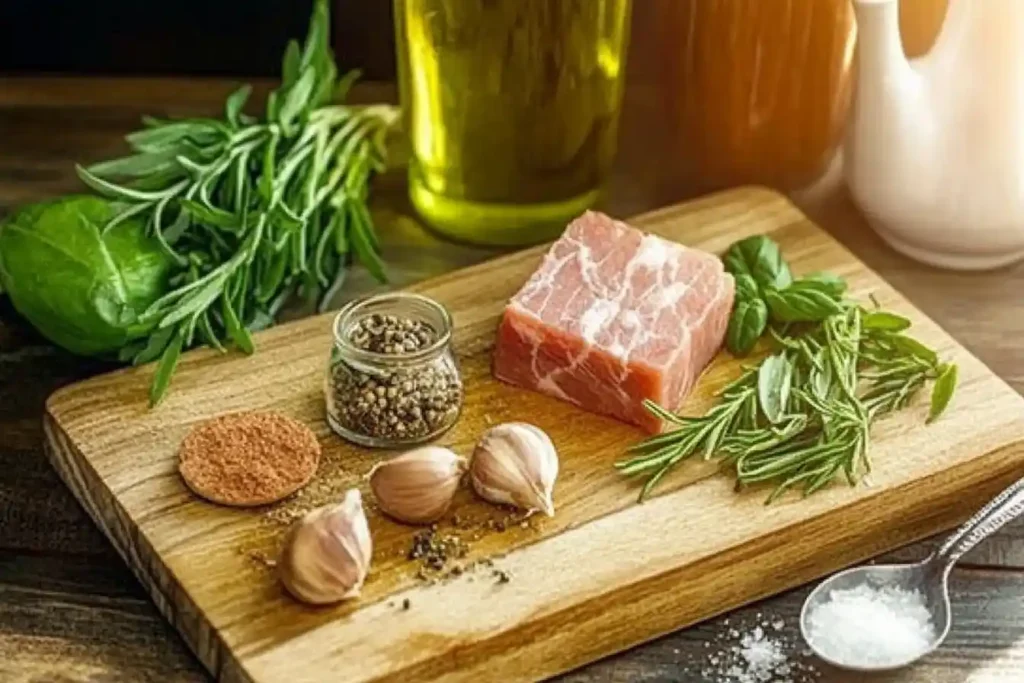
Frequently Asked Questions (FAQ)
Many people have questions about soaking deer roast, and this section addresses the most common ones to streamline your cooking process.
What is the best way to soak deer meat?
There isn’t a single best method, but options like buttermilk, saltwater brine, and vinegar solutions are popular for their effective tenderizing and flavor-enhancing abilities. Each method works differently, so choose based on your flavor preference and available ingredients.
How long should you soak deer meat?
The optimal soaking time depends on the liquid used. For buttermilk or saltwater brines, 8–12 hours is perfect. For more intense marinades like wine or vinegar-based, stick to a shorter duration, usually 4–6 hours, to avoid over-marinating.
Does soaking deer meat in milk help?
Absolutely! Milk and its alternatives, like buttermilk, are widely praised for their ability to reduce the gamey taste of venison while keeping the meat tender and moist. This method is particularly suitable for lighter palates.
What is the purpose of soaking deer meat?
Soaking enhances both texture and flavor. It tenderizes the meat by breaking down connective tissues while simultaneously infusing flavor and reducing any unwanted gamey notes. This preparation step can make all the difference in achieving a perfect deer roast.
Conclusion
Soaking deer roast is a simple yet transformative step that enhances both flavor and texture. By thoughtfully choosing your marinade and avoiding common errors, you can create a truly memorable dish. Each method—whether buttermilk, saltwater brine, or vinegar solution—offers unique benefits, so don’t hesitate to experiment with different approaches.
As you prepare your next deer roast, remember the tips shared here to ensure a flawless result. Pay attention to soaking times, proper handling, and ensuring full marinade coverage. Whether you’re cooking for a special occasion or a casual family dinner, soaking deer roast will elevate your culinary experience to new heights.
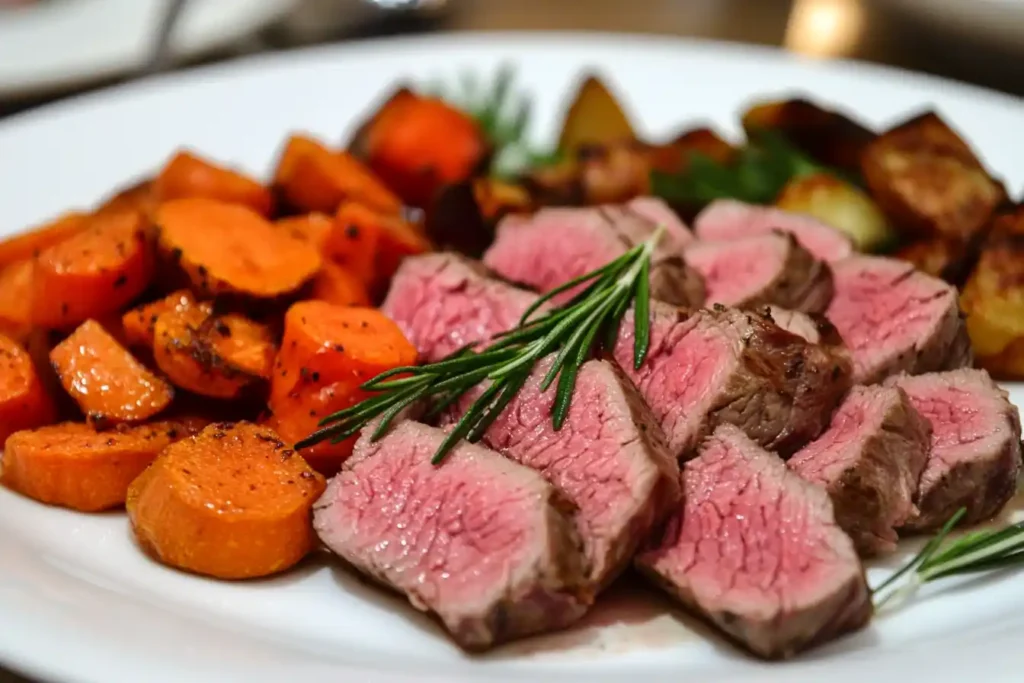
Ready to wow your guests? Get started with your favorite marinade today! Your deer roast is sure to be a hit!
For more amazing venison recipes and cooking inspiration, explore resources like AllRecipes’ extensive venison collection today!

